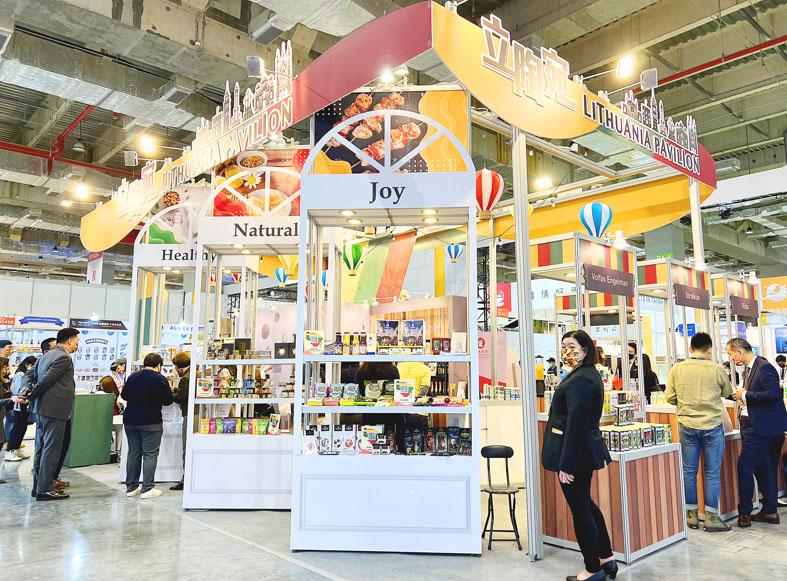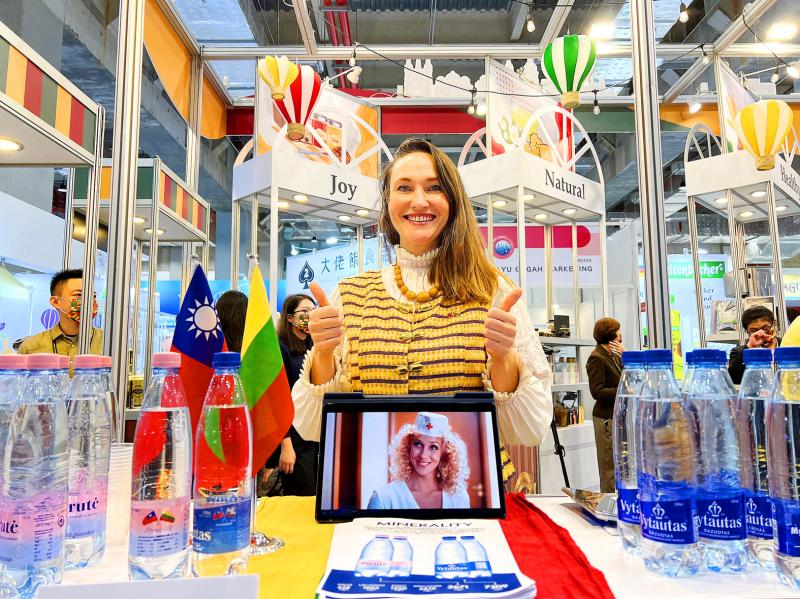The annual international food show Food Taipei opened yesterday, with the first-ever Lithuanian pavilion drawing a lot of attention.
The Lithuanian pavilion is one of 15 national pavilions featured at the show, and is participating for the first time because of the growing friendship and mutual support between the two countries, Taiwan External Trade Development Council (TAITRA, 外貿協會) chairman James Huang (黃志芳) said.
The pavilion, which features 25 companies, including importers and distributors of Lithuanian products, opened with a traditional dance performance and Huang presenting a large block of chocolate decorated with depictions of Taiwan and Lithuania, a heart and a Christmas tree.

Photo: CNA
“Lithuania is our new friend in Europe. It is a very friendly nation that supports Taiwan wholeheartedly and TAITRA reciprocated by inviting some of the Lithuanian pavilion participants,” Huang said.
Huang was referring to the Baltic state allowing Taiwan to open a representative office in Vilnius last month using the name “Taiwanese” as its official title. Taiwan’s representative offices in other European countries usually use “Taipei” in their official title.
Huang said he believed Taiwanese would be eager to buy Lithuanian products to show their gratitude to the country, adding that Lithuania can use the opportunity to introduce its products to Taiwan.

Photo: CNA
Two products featured at the Lithuanian pavilion are a special buckwheat grain that Lithuanians boil and eat with butter and a high mineral content spring water.
Ausra Andriuskaite, chairwoman of the Lithuanian community in Taiwan, said that even though there are only about 22 Lithuanian residents in Taiwan, she is still confident that Lithuania’s food products would find success in Taiwan, because consumers have similar preferences.
“Lithuanians and Taiwanese like to eat good quality and healthy food, and food from Lithuania is exactly like that,” said Andriuskaite, who is married to a Taiwanese and has lived in Taiwan for the past seven years.
“Taiwanese also like to try new things and they support Lithuania, so for sure they will want to taste the country’s food products,” she added.
Taiwan’s bilateral trade with Lithuania totaled US$155.692 million in the first 11 months of this year, with US$116.863 million in exports and US$38.829 million in imports, Bureau of Foreign Trade statistics showed.
Another national pavilion that drew a lot of attention was the Indonesian showcase, which features 10 companies offering food, snacks and sauces from global brand names, as well as small and medium-sized enterprises.
Trade analyst Muhammad Fuad Hamzah from the Indonesia Economic and Trade Office to Taipei said that Indonesian snacks are popular in Taiwan, many of which can be found at Southeast Asian grocery stores and big supermarket chains.
Taiwan imported US$44.802 million of Indonesian processed food from January to last month, an 11 percent increase from the same period last year, Fuad said.
Meanwhile, the Somaliland pavilion attracted scores of visitors eager to sample the country’s cooked food, such as a meat jerky known as muqmad and a confectionery called halwa.
Somaliland Representative to Taiwan Mohamed Hagi said it is the first time his office is taking part in the trade show, and their objective is to share the country’s culinary culture with Taiwanese before bringing a larger delegation of food manufacturers and distributors next year.
“Next year, we are planning to have a very big presence, and to invite our food companies and big restaurants to exhibit more about Somaliland’s culture to Taiwanese people,” he said.
Food Taipei, which runs until Saturday, is showcasing products from 28 countries and 478 businesses, spread out over 1,120 booths at Taipei Nangang Exhibition Center’s Hall 2.

Sweeping policy changes under US Secretary of Health and Human Services Robert F. Kennedy Jr are having a chilling effect on vaccine makers as anti-vaccine rhetoric has turned into concrete changes in inoculation schedules and recommendations, investors and executives said. The administration of US President Donald Trump has in the past year upended vaccine recommendations, with the country last month ending its longstanding guidance that all children receive inoculations against flu, hepatitis A and other diseases. The unprecedented changes have led to diminished vaccine usage, hurt the investment case for some biotechs, and created a drag that would likely dent revenues and

Global semiconductor stocks advanced yesterday, as comments by Nvidia Corp chief executive officer Jensen Huang (黃仁勳) at Davos, Switzerland, helped reinforce investor enthusiasm for artificial intelligence (AI). Samsung Electronics Co gained as much as 5 percent to an all-time high, helping drive South Korea’s benchmark KOSPI above 5,000 for the first time. That came after the Philadelphia Semiconductor Index rose more than 3 percent to a fresh record on Wednesday, with a boost from Nvidia. The gains came amid broad risk-on trade after US President Donald Trump withdrew his threat of tariffs on some European nations over backing for Greenland. Huang further

CULPRITS: Factors that affected the slip included falling global crude oil prices, wait-and-see consumer attitudes due to US tariffs and a different Lunar New Year holiday schedule Taiwan’s retail sales ended a nine-year growth streak last year, slipping 0.2 percent from a year earlier as uncertainty over US tariff policies affected demand for durable goods, data released on Friday by the Ministry of Economic Affairs showed. Last year’s retail sales totaled NT$4.84 trillion (US$153.27 billion), down about NT$9.5 billion, or 0.2 percent, from 2024. Despite the decline, the figure was still the second-highest annual sales total on record. Ministry statistics department deputy head Chen Yu-fang (陳玉芳) said sales of cars, motorcycles and related products, which accounted for 17.4 percent of total retail rales last year, fell NT$68.1 billion, or

HSBC Bank Taiwan Ltd (匯豐台灣商銀) and the Taiwan High Prosecutors Office recently signed a memorandum of understanding (MOU) to enhance cooperation on the suspicious transaction analysis mechanism. This landmark agreement makes HSBC the first foreign bank in Taiwan to establish such a partnership with the High Prosecutors Office, underscoring its commitment to active anti-fraud initiatives, financial inclusion, and the “Treating Customers Fairly” principle. Through this deep public-private collaboration, both parties aim to co-create a secure financial ecosystem via early warning detection and precise fraud prevention technologies. At the signing ceremony, HSBC Taiwan CEO and head of banking Adam Chen (陳志堅)